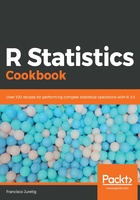
上QQ阅读APP看书,第一时间看更新
How to do it...
In this case, we will compare R against Rcpp (C++) for the following task. We will load a vector and a matrix. Our function will loop through each element of the vector, through each row, and through each row and column of that matrix, counting the number of instances where the elements of the matrix are greater than the ones in the vector.
- Save the C++ code into a file named rcpp_example.cpp and we will source it from an R script:
#include <Rcpp.h>
using namespace Rcpp;
// [[Rcpp::export]]
int bring_element (NumericVector rand_vector, NumericMatrix rand_matrix) {
Rcout << "Process starting" << std::endl;
int mcounter = 0;
for (int q = 0; q < rand_vector.size();q++){
for (int x = 0; x < rand_matrix.rows();x++){
for (int y = 0; y < rand_matrix.cols();y++){
double v1 = rand_matrix.at(x,y);
double v2 = rand_vector[q];
if ( v1 < v2){
mcounter++;
}
}
}
}
Rcout << "Process ended" << std::endl;
return mcounter;
}
- In the corresponding R script, we need the following code:
library(Rcpp)
sourceCpp("./rcpp_example.cpp")
Rfunc <- function(rand__vector,rand_matrix){
mcounter = 0
for (q in 1:length(rand__vector)){
for (x in 1:dim(rand_matrix)[1]){
for (y in 1:dim(rand_matrix)[2]){
v1 = rand_matrix[x,y];
v2 = rand__vector[q];
if ( v1 < v2){
mcounter = mcounter+1
}
}
}
}
return (mcounter)
}
- Generate a vector and a matrix of random Gaussian numbers:
some__matrix = replicate(500, rnorm(20))
some__vector = rnorm(100)
- Save the starting and end times for the Rcpp function, and subtract the starting time from the end time:
start_time <- Sys.time()
bring_element(some__vector,some__matrix)
end_time <- Sys.time()
print(end_time - start_time)
- Do the same as we did in the previous step, but for the R function:
start_time <- Sys.time()
Rfunc(some__vector,some__matrix)
end_time <- Sys.time()
print(end_time - start_time)
The C++ function takes 0.10 seconds to complete, whereas the R one takes 0.21 seconds. This is to be expected, as R loops are generally slow, but they are extremely fast in C++:
